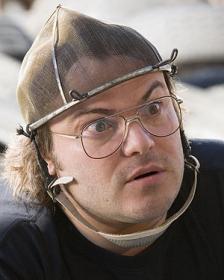VHS Bandits : Son of Rambow & Be Kind Rewind

 With the rise of so-called 'user generated content', a strange phrase that conjours up images of cinemagoers as drug users, and 'professional filmmakers' as dealers who would never use their own supply, it's inevitable that the film industry would have something to say on the matter. And as with buses and most films from those dealing with the massive (Armagedon, Deep Impact) to the micro (Antz, A Bugs Life), two come at once.
With the rise of so-called 'user generated content', a strange phrase that conjours up images of cinemagoers as drug users, and 'professional filmmakers' as dealers who would never use their own supply, it's inevitable that the film industry would have something to say on the matter. And as with buses and most films from those dealing with the massive (Armagedon, Deep Impact) to the micro (Antz, A Bugs Life), two come at once.
Interestingly, each come from cult directors - one French, one British - and both Michel Gondry (Be Kind Rewind) and Garth Jennings (Son of Rambow) had their roots in home-made animations and, later, music video. Likewise both skip the latest tech for basic VHS and focus on the oft' forgotten fact that making films is often much more fun than watching them.
What would Viacom's lawyers make of Rambow's Lee Carter, a film pirate of the highest order, who makes the short fan films, homages, mashups, recuts and so forth which Viacom have recently pulled from YouTube seem all the more harmless.Both are buddy movies, where the process of creation helps the characters to understand themselves and each other, while showing how filmmaking can bring a community - or family - together. And while Rambow is set in the 80s with child protagonists, Gondry, a self-declared eternal 12-year-old, paints a playful New Jersey suburb where time has stopped enough for it too to feel a work of nostalgia. Even the 'evil' property developer seems more outdated than the ultra modern Clamp in Gremlins 2. Both feelgood movies slip, ultimately, into schmalz, but of distinctly British and American flavours. In Gondry's New York, little is resolved, but the community comes together and is, erm, United. In Jennings' Hertfordshire, the melodrama escalates, erupts with a tearful speech, and the family reconnects. Gondry's America has a far stronger community, tho Hollywood - in the guise of Signourey Weaver, perhaps looking for the gatekeeeper - is treated without sympathy.
Curious then that the film was financed by Universal Studio's offshoot Focus Features, whose lawyers - no doubt - would have shut down the Be Kind Rewind store for copyright infringement in a heartbeat. It was, after all, Universal who tried to take Sony to court in the 80s for producing a video cassette, the Betamax, which could be used for making private copies (as well as home movies). Thankfully they lost.
Likewise Paramount Vantage, who bought Son of Rambow at Sundance 07 for a stonking $8m, are part of the Viacom Group, who are currently taking YouTube to court in a similarly significant testcase for $1bn (a Dr Evil-shaped figure). What would Viacom's lawyers make of Rambow's Lee Carter, who in the opening scene is filming a new release in the cinema, which makes the short fan films, homages, mashups, recuts and so forth which Viacom have pulled from YouTube seem all the more harmless. The parrallels between the two films - especially when you read Tom Fogg's interview with Jennings and producer Nick Goldsmith in 2000, where they idolise Gondry and talk of Rambow for the first time - is a little uncanncy.
But there are differences, namely in the filmmakers' sensibilites. Gondry paints his surreal vision on almost everything he sees, a kind of live action cartoon where realism is generally forsaken : in the film and the 'sweded films' cinema is a fantasy land where we are to fly away from reality and its problems. In Rambow, the surrealism is mostly in WIll's mind, projected onto the represive environment he's surrounded by, literally bursting out of the edges of his Bible. The humour is subtle and understated. And cinema becomes more a metaphor for personal struggle and the hero's journey. In fact the French star of the kids film is ultimately dismissed as a style-conscious fantasist (tho still largely adored).
Either way, these films are both timely and fun. And if one of them doesn't inspire you to put down the funding application and pick up a camera, and remember how perhaps before you got caught up in the 'film business' you too just loved making movies, the other one should.